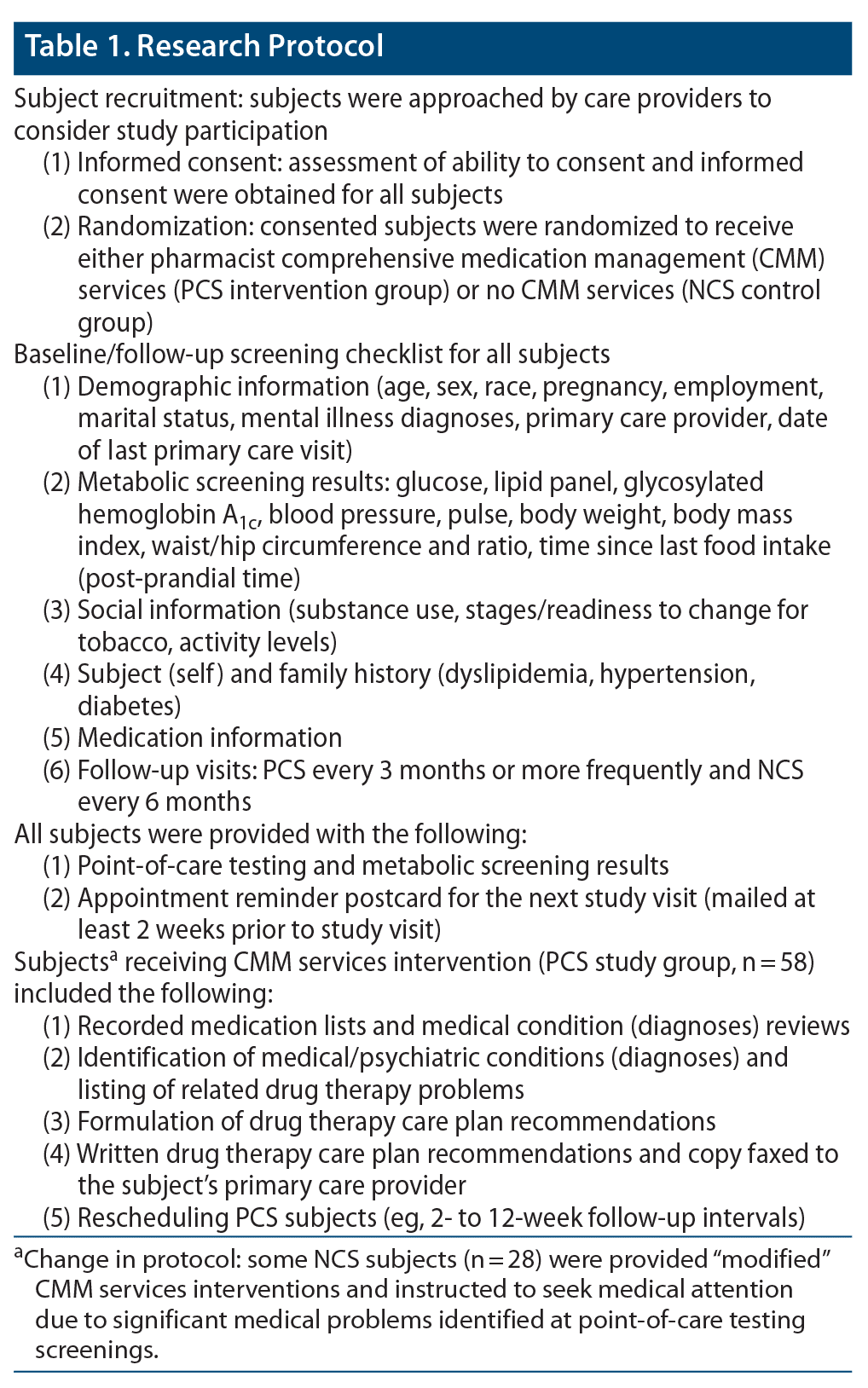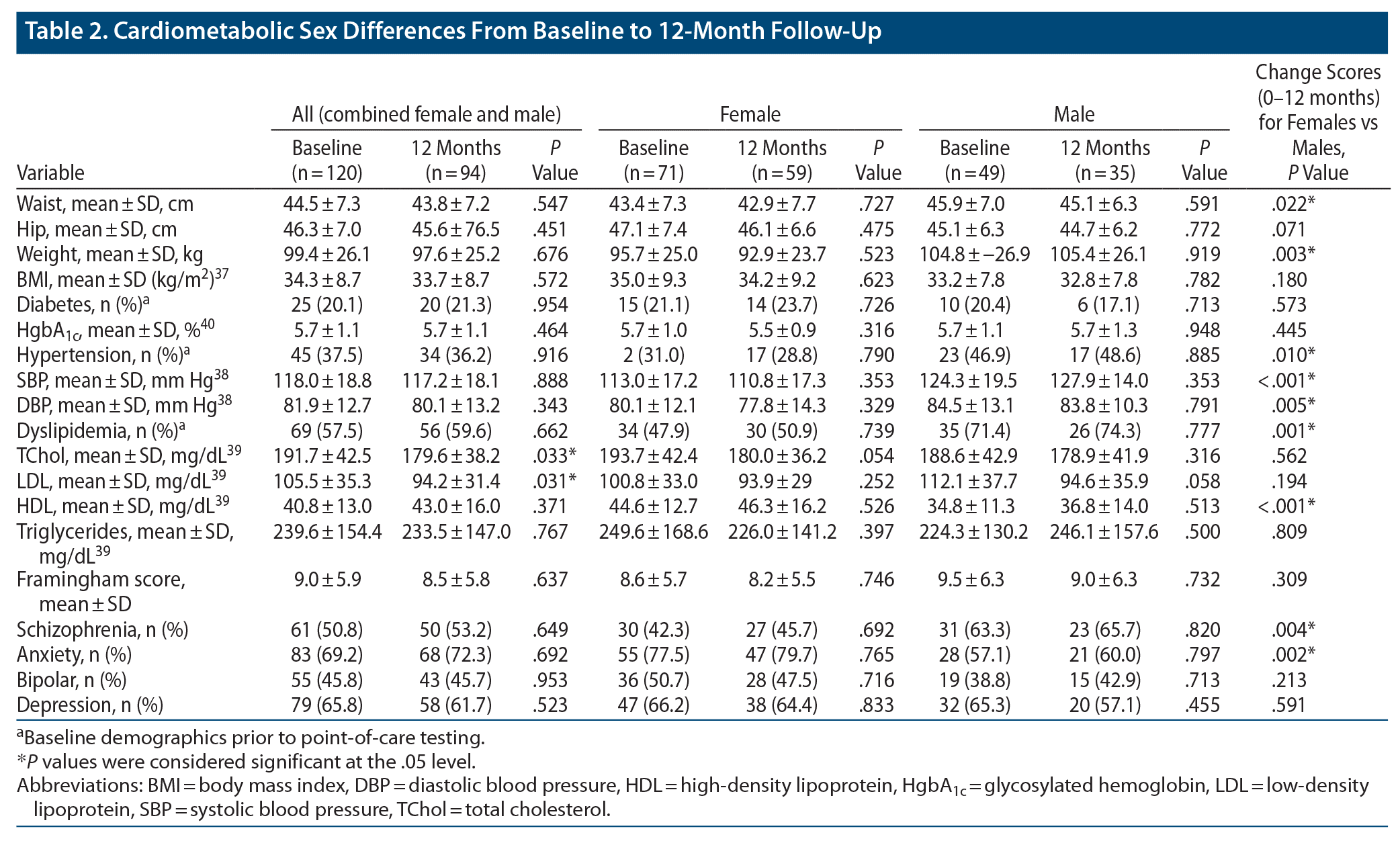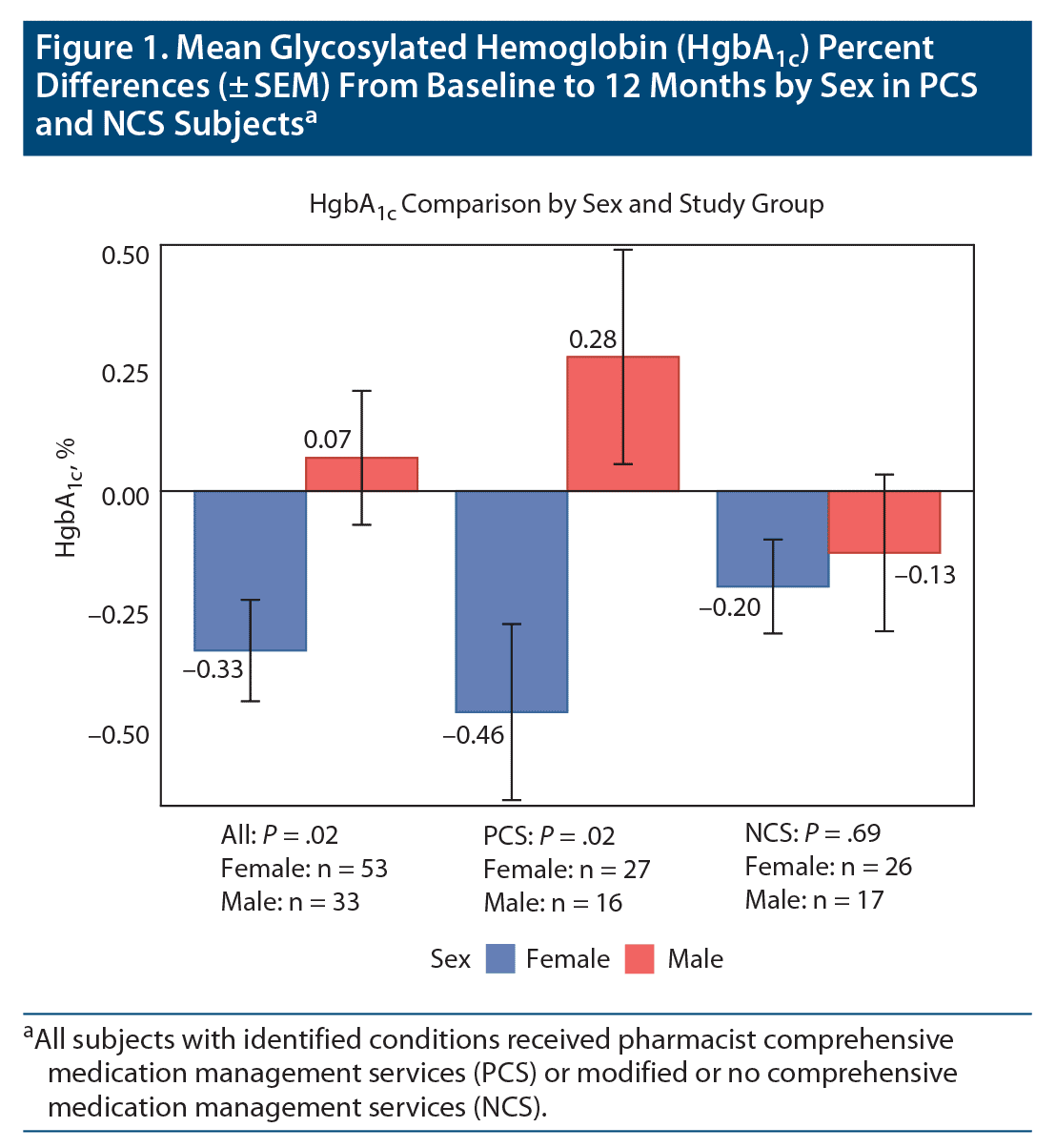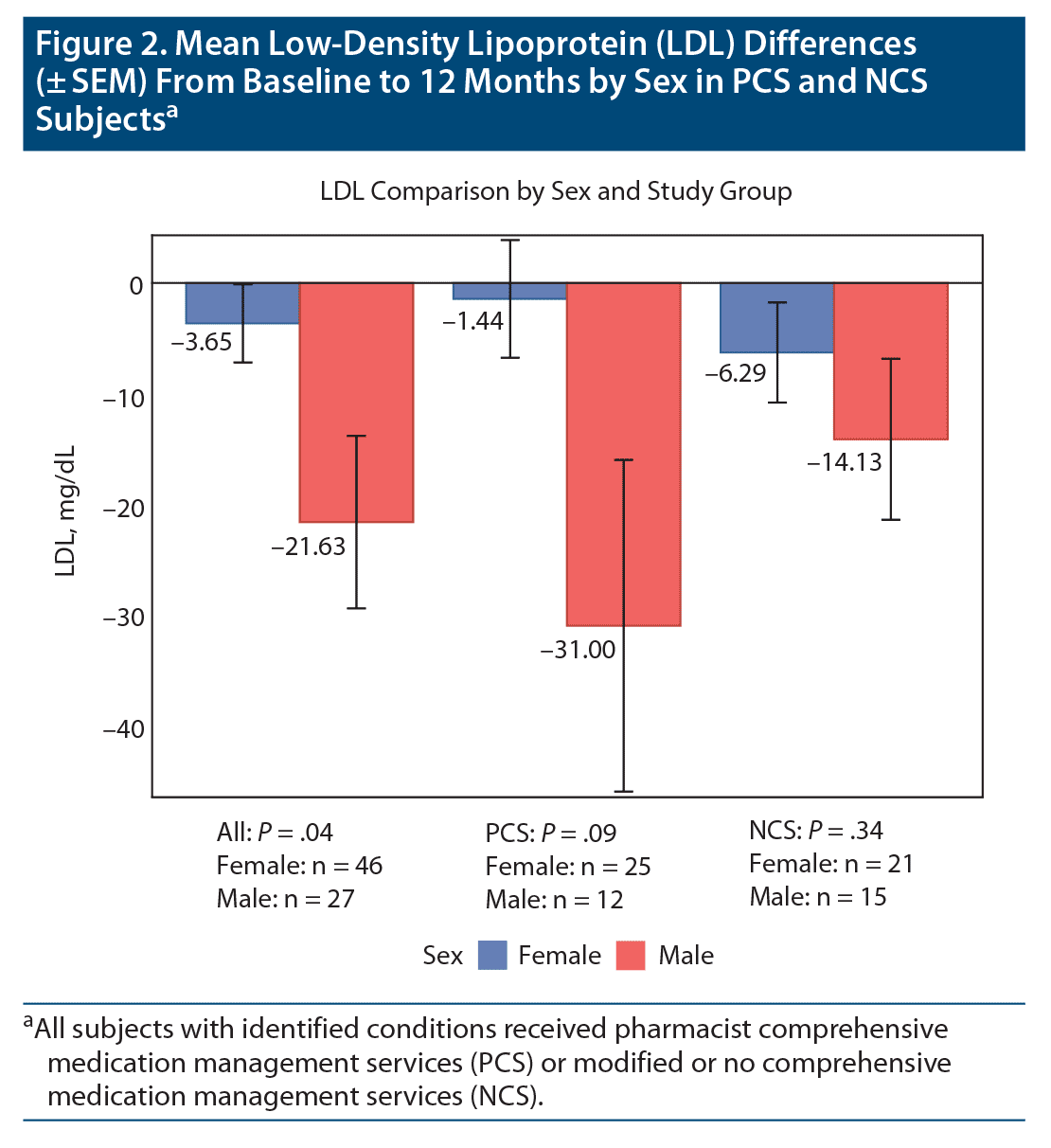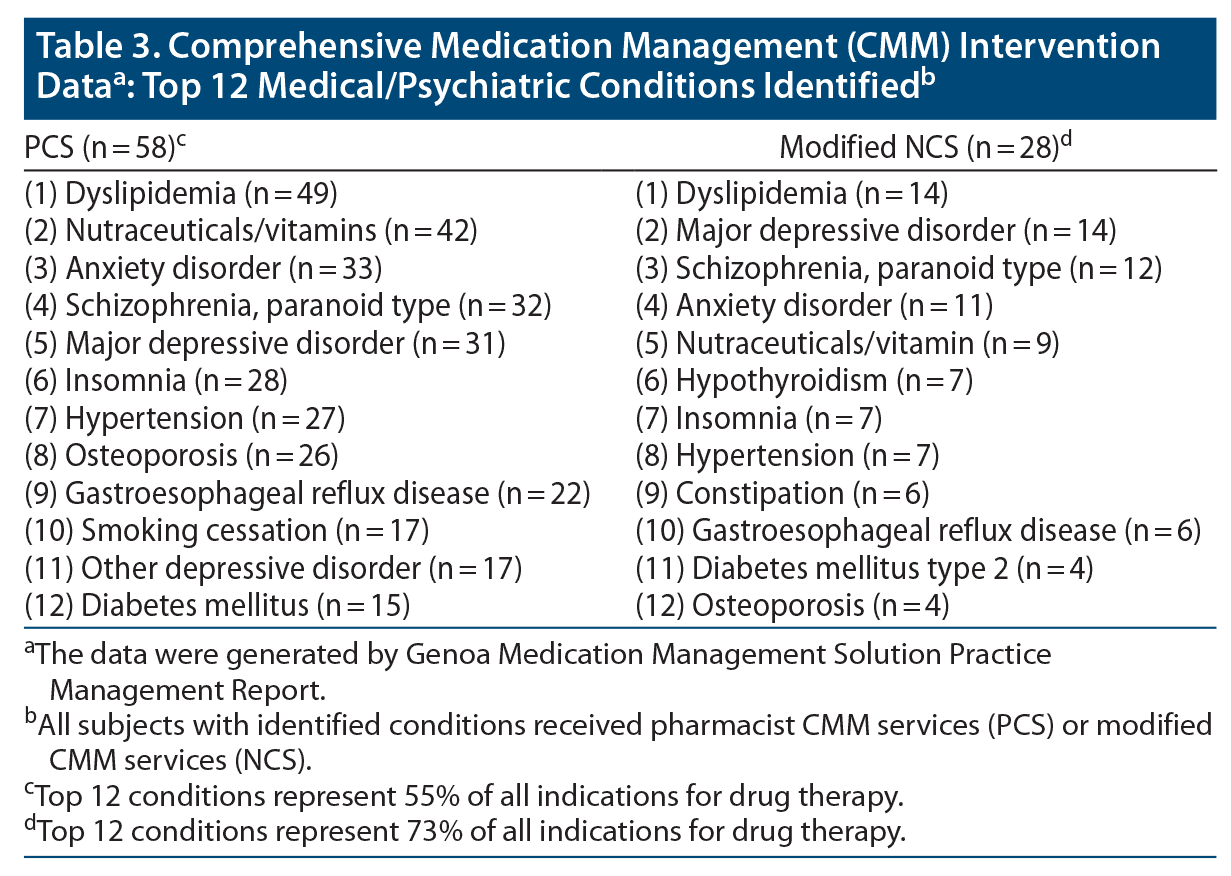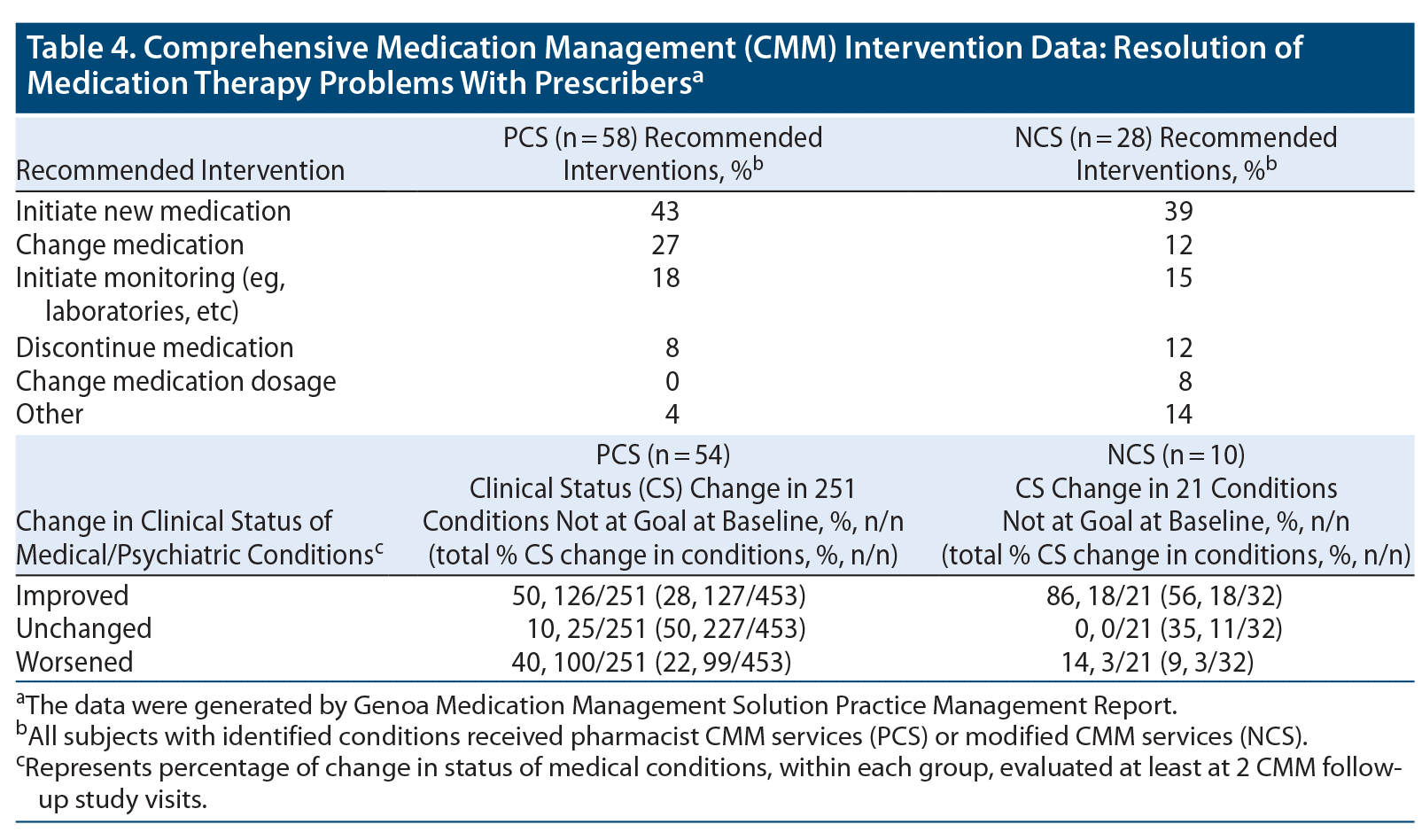ABSTRACT
Objective: To define sex differences in cardiometabolic indice changes over 12 months in patients on antipsychotics and to describe treatment complexity, interventions, and patient satisfaction of pharmacist comprehensive medication management (CMM) services.
Methods: Secondary analyses of time effect–associated sex differences in cardiometabolic indices within and between study groups were done at baseline and 12 months. Each group consisted of 60 subjects who received full pharmacist CMM services (PCS) and 60 subjects who received either modified or no CMM services (NCS). Pharmacist CMM services are a team-based practice of providing direct patient care.
Results: Significant sex differences in mean change score were observed from baseline to 12 months in the combined PCS and NCS subjects. Compared to men, women had greater body weight (P = .003) and waist measurement (P = .02) reductions and increased serum level of high-density lipoproteins (P < .001). In contrast, men had greater systolic (P < .001) and diastolic (P = .005) blood pressure levels, more hypertension diagnoses (P = .01), and less dyslipidemia diagnoses (P = .001) compared to women at 12 months. Significant sex differences were observed in combined PCS and NCS groups for glycated hemoglobin (HgbA1c) (women: −0.33%, P = .02) and low-density lipoprotein (men: −21.63 mg/dL, P = .04) at 12 months. In PCS women, a significant (P = .02) reduction in mean HgbA1c percentages (−0.46%) compared to PCS men (0.28%) was observed at 12 months. A higher percentage (62%, n = 28/45) of PCS women compared to PCS men (38%, n = 17/45) at 12 months continued to receive CMM services. Satisfaction survey results positively favored CMM services; however, the response rate was only 25% (n = 18/72).
Conclusions: Women on antipsychotics appear more likely to keep follow-up visits, return satisfaction surveys, reduce abdominal weight, and improve both HgbA1c percentages and high-density lipid levels compared to men over 12 months. Women were satisfied overall with CMM services. Recognition of sex differences can promote a more personalized patient-centered care approach among patients prescribed antipsychotics.
Trial registration: ClinicalTrials.gov identifier: NCT02029989
Prim Care Companion CNS Disord 2021;23(2):19m02493
To cite: Schneiderhan ME, Li X. Observed sex differences in cardiometabolic indices in patients on antipsychotics: secondary analyses of a 12-month multicenter, randomized, controlled trial. Prim Care Companion CNS Disord. 2021;23(2):19m02493.
To share: https://doi.org/10.4088/PCC.19m02493
© Copyright 2021 Physicians Postgraduate Press, Inc.
aDepartment of Pharmacy Practice and Pharmaceutical Sciences, College of Pharmacy, University of Minnesota, Duluth, Minnesota
bDepartment of Mathematics and Statistics, University of Minnesota, Duluth, Minnesota
*Corresponding author: Mark E. Schneiderhan, PharmD, College of Pharmacy, University of Minnesota, Duluth, 232 Life Science, 1110 Kirby Drive, Duluth, MN 55812-3003 ([email protected]).
Antipsychotic medications for schizophrenia and bipolar disorder are associated with greater modifiable cardiometabolic risks including obesity, diabetes, dyslipidemia, and hypertension.1–6 Sex differences are linked to higher associated risks for antipsychotic-associated hyperinsulinemia, abdominal obesity, and associated insulin resistance. Studies7–15 suggest that women have higher associated risks for abdominal obesity, metabolic syndrome, type 2 diabetes mellitus, and dyslipidemia compared to men. Genetic biomarkers for estrogen, testosterone, leptin, and methylenetetrahydrofolate reductase activity and other biomarkers, such as brain-derived neurotrophic factor (BDNF), may provide signals and etiologies for sex differences in hyperglycemia, dyslipidemia, and hypertension.7,16–19 Nonmodifiable risks such as sex differences may likely contribute to severity of cardiometabolic antipsychotic side effects and possibly predict treatment outcomes.
Even after almost 20 years of compelling evidence, patients on antipsychotics continue to have inadequate monitoring and difficulty attaining goals of treatment for metabolic-related conditions.20–28 Nonmodifiable risks such as sex differences may contribute to complexities and poorer prognoses of some cardiometabolic comorbidities.
To address the problem of inadequate monitoring among individuals on antipsychotics, pharmacists providing comprehensive medication management (CMM) can assist health care providers by increasing attention on patient-centered medication outcomes.22,23 Pharmacist CMM services are a team-based practice of providing direct patient care by resolving medication-related problems to optimize patient medication treatment outcomes.23,29–38
In the original publication,23 which the current study builds on, patients on antipsychotic medications receiving CMM services were found to have an increased likelihood of identifying dyslipidemia and hypertension monitored using point-of-care testing (POCT) compared to usual care. However, this study23 did not fully describe the research protocol, pharmacist CMM intervention, and baseline to endpoint POCT and metabolic-related changes over 12 months. The purpose, therefore, is to expand on the previously published study to explore if sex differences may be associated with changes in cardiometabolic indices (eg, diabetes, hypertension, and dyslipidemia) over 12 months. A secondary objective is to describe CMM services in terms of medical complexity and pharmacist interventions including patient satisfaction among subjects prescribed antipsychotics. (See the original study23 for research design, flow diagram of study subjects, baseline subject demographics, and baseline/12-month POCT results of metabolic syndrome risk criteria.)
METHODS
Secondary statistical analyses were conducted on data from a previously published 12-month prospective, multisite, randomized, controlled research design comprised of subjects recruited from 3 community mental health clinics.23 All subjects taking antipsychotic agents received anthropometrics, glycated hemoglobin (HgbA1c) results, sphygmometer measurements, and lipid results provided by the pharmacist investigators at each study visit.23 Baseline and 12-month diagnoses used in the sex comparison analyses included diabetes, dyslipidemia, hypertension, schizophrenia, bipolar disorder, anxiety disorder, and major depressive disorder. Medication-related metabolic risk scores were assigned to antipsychotic agents and other medications (see original study23).
The study was approved by the institutional review board (study no. 0900M72212; ClinicalTrials.gov identifier: NCT02029989). The duration of the study by the dates of first and last subject visits was from January 20, 2010, to January 13, 2012. Subjects (females: 59.2%, n = 71/120 and males: 40.8%, n = 49/120) were randomized to receive either full pharmacist CMM services (PCS) (total: n = 60, females: n = 36, males: n = 24) or modified or no CMM services (NCS) (control subjects total: n = 60, females n = 35, males n = 25). Modified CMM services were provided to almost half of the control subjects identified with abnormal POCT findings. At the end of the 12-month period, the number of subjects completing the study was PCS: n = 45 and NCS: n = 49. Table 1 describes the research protocol.
CMM services treatment interventions and point-of-care results in both PCS and NCS subject groups were documented by the CMM research pharmacists using a proprietary electronic medical record (EMR) currently known as Genoa Medication Management Solution.30 Pharmacist researchers did not have collaborative prescribing authority to make medication changes during the study. At study completion, a practice management report by the EMR software (created on April, 5, 2013) summarized the CMM services including clinical complexity and interventions. The CMM services clinical complexity summaries include number of medical/psychiatric conditions, number of medications, number of identified medication therapy problems, and how these problems were addressed. The clinical outcome measure of the CMM services interventions was defined as the percentage change in medical/psychiatric conditions status and summarized as “improved,” “unchanged,” or “worsened.” Change in clinical status of conditions was measured in subjects (PCS: n = 54, NCS: n = 10) who had at least 2 study follow-up visits.
Statistical Analyses
Standard descriptive statistics included mean and standard deviation change score differences for continuous variables of cardiometabolic indices based on the National Cholesterol Education Program’s Adult Treatment Panel III39,40 including waist and hip circumference (cm), weight (kg), body mass index,41 systolic and diastolic blood pressure (mm Hg),42 total cholesterol (mg/dL), low-density lipoprotein (LDL, mg/dL), high-density lipoprotein (HDL, mg/dL), triglycerides (mg/dL),43 and HgbA1c (%)44 at baseline and 12 months. Categorical variables included frequency and percentages of diabetes, dyslipidemia, hypertension, Framingham scores,45 psychiatric diagnoses, and patient care survey items. Comparisons of sex differences were completed using independent t tests for continuous variables and χ2 association test for categorical variables. To adjust for time effect from baseline to 12 months, mean score change differences (12 months subtracted from baseline) were calculated and t tests (mixed model) were performed using difference as dependent variable and sex as independent variable. Two-sided P values were calculated and reported to indicate the significance (ie, P < .05). Baseline to 12 months 95% confidence interval mean and standard error of mean (± SEM) change score differences were calculated in groups stratified by sex randomized to PCS and NCS subject groups for HgbA1c and LDL values. The Department of Mathematics and Statistics at the University of Minnesota, Duluth provided statistical consultation support. SAS version 9.4 (SAS Institute Inc, Cary, North Carolina) was used for all statistical analyses including descriptive statistics, t tests, and χ2 tests.
RESULTS
Cardiometabolic Analyses
A total of 120 subjects including 71 female (PCS: n = 36, 51%; NCS: n = 35, 49%) and 49 male (PCS: n = 24, 49%; NCS: n = 25, 51%) subjects participated at baseline. The baseline mean age of the subjects was 42.9 ± 11.3 years. There were no significant mean age differences between women 42.4 ± 11.5 (n = 71) and men 43.7 ± 11.1 (n = 49). At the end of the 12-month period, the remaining proportion of subjects completing the study was 62% PCS females (n = 28/45) and 63% NCS females (n = 31/49) compared to 38% PCS males (n = 17/45) and 37% NCS males (n = 18/49). No statistical differences in cardiometabolic indices were observed when comparing PCS and NCS groups over 12 months. At baseline, PCS (80%, 48/60) and NCS (76.7%, 46/60) subjects were sedentary with no significant differences observed between the groups at baseline or 12 months. For antipsychotic risk scores, there were no statistical differences observed between/within the PCS and NCS groups at baseline or at 12 months. All of the subjects had relatively high mean total metabolic side effect risk scores approaching a score of 3 at baseline and at 12 months (see original study23).
A significant reduction in total cholesterol (P = .03) and LDL (P = .03) values was observed in combined subjects across groups and sex at 12 months (Table 2). Significant sex differences in mean change score were observed from baseline to 12 months in the combined PCS and NCS subject groups (Table 2). Compared to men, women had greater mean body weight (P = .003) and waist measurement (P = .02) reductions and increased mean serum level of HDLs (P < .001). Compared to women, men had greater mean systolic (P < .001) and diastolic (P = .005) blood pressures, more hypertension diagnoses (P = .01), and less dyslipidemia diagnoses (P = .001). Mean diagnostic differences across sex were also observed after 12 months including anxiety (female > male) and schizophrenia (male > female) (Table 2).
A significant mean change score difference (P = .02) was observed over 12 months for HgbA1c in combined female groups (n = 53; −0.33%; 95% CI, −0.55% to −0.12%) versus combined male groups (n = 33; 0.07%; 95% CI, −0.22% to 0.36%) (Figure 1). Also, a significant mean change score difference (P = .02) was observed for HgbA1c percentages in PCS females (n = 27; −0.46%; CI, −0.84% to −0.08%) compared to PCS males (n = 16; 0.28%; 95% CI, –0.2% to 0.8%) over 12 months (see Figure 1). There was no significant change score mean difference found between NCS female (n = 26) and NCS male (n = 17) subjects for HgbA1c indices at 12 months.
A significant mean change score difference (P = .04) was observed for LDL in all male subjects (n = 27; −21.63 mg/dL; 95% CI, −37.7 mg/dL to −5.6 mg/dL) versus female (n = 46; −3.65 mg/dL; 95% CI, −10.8 mg/dL to 3.5 mg/dL) subjects over 12 months (Figure 2).
Practice Management Report: Treatment Complexity
CMM services were provided to a total of 86 subjects, including 97% (PCS: n = 58/60) who received extensive CMM services and 47% (NCS: n = 28/60) who received modified CMM services over 12 months. Dyslipidemia (73%, n = 63/86) was the top condition identified in the combined study groups receiving CMM services (Table 3). Hypertension (39.5%, n = 34/86) and diabetes (22%, 19/86) were also among the top 12 medical conditions identified in the combined study groups (see Table 3). A majority of the subjects were prescribed more than 5 medications. Pharmacist investigators resolved 712 medication therapy problems in 72% (n = 86/120) of combined subjects by often recommending the need for changing or starting new medications to medical providers, subjects themselves, subjects’ caregivers, or all parties.
In the PCS group, pharmacists evaluated 453 (mean: 11.9; range, 4–28 per PCS subject) medical/psychiatric conditions and reviewed an average of 13 (range, 1–38) medications per subject over 236 documented study visits. A total of 691 medication therapy problems were identified and resolved with a majority (93%; n = 54/58) of PCS subjects having ≥ 5. The top 3 medication therapy problems were “needs additional drug therapy” (50%, 346/691), “dose too low” (15.5%, 107/691), and “nonadherence” (11.5%, 79/691). Medical/psychiatric conditions associated with common medical therapy problems included diabetes mellitus: “dose too low”; dyslipidemia: “needs additional drug therapy” and “dose too low”; and hypertension: “adherence,” “needs additional drug therapy,” and “dose too low.”
Among NCS subjects (n = 28) receiving modified CMM services, 32 (mean: 5; range, 1–11 per NCS subject) medical/psychiatric conditions were identified. Pharmacists reviewed an average of 9 (range, 3–20) medications per subject. A total of 21 medication therapy problems were identified and resolved over 40 documented study visits. Common drug therapy problems associated with diabetes mellitus type 2 included “nonadherence,” medication “dose too low,” and “needs additional drug therapy.”
Practice Management Report: Interventions
The CMM pharmacist provided clinical recommendations based on the medical conditions and medical therapy problems identified and resolved at follow-up visits over 12 months. For PCS subjects, 51% had letters or facsimiles sent directly to their care provider; 42.5% of subjects and 6.5% caregivers were provided verbal recommendations to subjects by the CMM pharmacist. Likewise, 87% of NCS subjects had letters or facsimiles sent to their provider; 10% of subjects and 3% caregivers were provided verbal recommendations to subjects by the CMM pharmacist.
For medical/psychiatric conditions identified in the study groups, types of medication therapy problems most commonly resolved for both PCS (n = 58) and NCS (n = 28) subjects were initiating new medications, changing medication therapy, and obtaining laboratory monitoring (Table 4). Changes in medical conditions or clinical status were documented by the CMM pharmacists as “improved,” “unchanged,” or “worsened” in combined PCS (n = 54) and NCS (n = 10) subjects. For medical conditions not at goal at study baseline, 53% (144/272) of conditions improved, 9.2% (25/272) had no change, and 37.9% (103/272) of conditions worsened in the combined PCS (n = 54) and NCS (n = 10) subjects (see Table 4).
CMM Services Satisfaction Survey
After completion of the study, approximately 72 surveys were mailed to a sample group of study subjects. Survey participants consisted of 14 (78%) women and 4 (22%) men. Of the 18 surveys returned (25% response rate), 2 of the surveys had no responses and 1 survey was incomplete. Of the subjects who participated (n = 15), 40% were in the PCS group, 33% were in the modified NCS group, and 22% were not sure which group they were randomized to. The findings indicated that 50% of subjects (n = 17) felt their health improved and 44% (n = 17) indicated no change in physical health while in the study. A majority of the subjects (89%, n = 18) were satisfied or very satisfied with the counseling and care provided by the pharmacist and 83% (n = 18) would recommend these services to a friend. Seventy-eight percent (78%, n = 15) of subjects reported that they were more aware and more concerned (79%, n = 16) about their health problems (eg, weight, blood pressure, sugar, and cholesterol). A majority (83.3%, n = 16) of subjects indicated that they trusted the advice of the pharmacist; only 1 subject indicated not trusting the advice of the pharmacist and 2 subjects did not respond. Although 50% (n = 15) of the subjects indicated improved medication adherence after talking to the pharmacist, 33.4% were not being more medication adherent. Sixty-one percent of subjects (n = 15) indicated that either the nurse practitioner or the doctor accepted the pharmacist’s medication recommendations, and 22.2% of the subjects indicated that the recommendations were not accepted.
DISCUSSION
The primary key findings were significant reduction of body weight and waist circumference indices observed in combined female subject groups and significant HgbA1c % reductions observed in the PCS female subgroup. For combined male subject groups, significant mean worsening of cardiometabolic indices were observed including weight gain, abdominal obesity, higher associated diagnosed hypertension, and worsening HDL levels compared to female subjects over 12 months.
The significant reductions in mean HgbA1c percentages (0.27%–0.75%) observed in this study are comparable to pharmacist intervention groups in other reported studies.33,36,46–48 The beneficial impact of frequent direct patient care contacts is also supported by evidence of moderate reductions in HgbA1c in patients receiving approximately 6–15 hours of self-management education over a 1-year duration.49
The secondary key findings were descriptions of subjects’ clinical complexity, pharmacist interventions, and satisfaction surveys of CMM services. Our findings are similar to a retrospective study by Cobb,31 utilizing the same EMR software, which also showed improved clinical status in over 50% of subjects for medical conditions not at goal at baseline. The level of clinical complexity in our study is also comparable to larger CMM studies based on the number of medical and psychiatric comorbidities, number of prescribed medications, and types of medical therapy problems (ie, needs additional medication, dose too low, and adherence).38,47
The satisfaction survey, mostly completed by female subjects, indicated participants were satisfied overall with the pharmacists’ care, more aware and concerned with their health-related problems, and trusted recommendations provided by the pharmacists. Similar to satisfaction survey key findings, Cobb31 reported a 30% satisfaction survey response. Patients surveyed (n = 154) in a mental health setting were very satisfied with pharmacist CMM services.31
Other sex differences in the current study were consistent with other study findings regarding psychiatric diagnoses and health care utilization. For example, female subjects in this study were more likely to have an anxiety diagnosis and less likely to be diagnosed with schizophrenia compared to males at 12 months.50 Anxiety and depression can significantly increase diabetes risk severity in both females and males.50–52
A higher percentage of female subjects completed this 12-month study, which is consistent with the literature findings of higher rates of health care utilization among women compared to men.53,54 Women may respond better to social aspects of care and elicit more patient-centered communication compared to men, especially if psychosis is present.55
In summary, sex differences affecting multiple factors such as diabetes, anxiety symptoms, and the doctor-patient relationship may help explain this increase in health care utilization and help-seeking behaviors in women compared to men.52,56 Sex differences impacting the doctor-patient relationship may be affected by factors such as engagement in patient-centered communication,55 influences of psychosis risk predictive symptoms,57 and preferred provider-patient gender dyads58 in patients taking antipsychotics. Strategies to improve a patient’s utilization of health services may include providing frequent telephone/mailed reminders, flexible rescheduling to facilitate the initial clinical encounter, immediate outpatient follow-up after hospital discharge, scheduled visits with an established provider, and referral to case management.59
Limitations
Specific to this secondary analysis, a major limitation in the practice management report outlining the CMM services interventions was the inability to stratify results by sex, which obscured the impact of the CMM services for female and male subjects. The low subject participation and higher female representation in the satisfaction survey is also a limitation. For additional limitations see the original study.23
For POCT lipid indices, several missing data points were the result of the POCT device limitation in calculating an LDL value. The POCT device limitation occurred when triglycerides were ≥ 650 mg/dL (severe hypertriglyceridemia—fasting ≥ 500 mg/dL43). As a result, 10 subjects (female: n = 6, male: n = 4) were excluded from the statistical analysis of lipid indices. However consistent with the results, among the 6 excluded female subjects, triglycerides improved to near-moderate hypertriglyceridemia in 50% of female subjects (NCS: n = 2, PCS: n = 1) compared with worsening or no improvement seen in male subjects (PCS: n = 2, NCS: n = 2) over 12 months.
Strengths
The results of this study support the emerging evidence supporting sex differences affecting cardiometabolic indices. This study also contributes to the literature in the areas including observing sex differences in cardiometabolic indices over 12 months, impact of sex differences on rates of appointment no shows, response to disease state management, and patient satisfaction of pharmacist CMM practices in mental health settings. This study provides a signal to support future research to determine if sex differences affect treatment outcome of metabolic indices with regular follow-up visits among subjects treated with antipsychotics.
CONCLUSION
There is increasing evidence that sex-based dimorphic neurologic and physiologic mechanisms can impact morbidity and mortality among patients with cardiometabolic conditions. Female patients taking antipsychotics appear to be more likely to keep follow-up visits, return satisfaction survey information, reduce body weight, decrease waist circumference, and show improvement in HgbA1c percentages and HDL levels compared to males. Females were satisfied overall with pharmacists providing interprofessional team-based CMM services. Recognition of sex differences can promote a more personalized patient-centered care approach to ensure goals of therapy are being achieved among patients prescribed antipsychotics.
Submitted: June 2, 2019; accepted October 23, 2020.
Published online: April 8, 2021.
Potential conflicts of interest: None.
Funding/support: Medica Foundation, Minneapolis, Minnesota provided primary grant support; Peters Institute for Pharmaceutical Care Minneapolis, Minnesota. University of Minnesota provided primary grant support; and University of Minnesota, College of Pharmacy, Department of Pharmacy Practice and Pharmaceutical Sciences–Duluth provided secondary statistical analysis funding support.
Role of the sponsor: The sponsors of this study had no role in the design and conduct of the study including data collection, management, analyses, or review of the analyses. The sponsors had no role in the preparation, review, or approval of this manuscript.
Acknowledgments: Hillary Heiling, BS, currently a doctoral student at the Department of Biostatistics, University of North Carolina, Chapel Hill, North Carolina, provided the initial statistical analyses. Ms Heiling has no conflicts of interests to report.
Clinical Points
- Sex differences in women are linked to higher associated risks for antipsychotic-related side effects, metabolic syndrome, type 2 diabetes mellitus, and dyslipidemia compared to men.
- Female patients may be more likely to attend every 3-month metabolic monitoring visit with pharmacists, achieve gradual weight loss, and improve glucose control over 12 months compared to male patients.
- Recognition of sex differences can promote more personalized patient-centered care to ensure goals of therapy are being achieved among patients prescribed antipsychotics.
References (59)

- Holt RIG, Mitchell AJ. Diabetes mellitus and severe mental illness: mechanisms and clinical implications. Nat Rev Endocrinol. 2015;11(2):79–89. PubMed CrossRef
- De Hert M, Detraux J, van Winkel R, et al. Metabolic and cardiovascular adverse effects associated with antipsychotic drugs. Nat Rev Endocrinol. 2011;8(2):114–126. PubMed CrossRef
- Lerch S. The Role State Mental Health Authorities Can Play in Delivery of Integrated Primary and Behavioral Health Care for People with Serious Mental Illness, including those with Co-Occurring Substance Use Disorders. National Association of State Mental Health Directors. Published 2017. Accessed July 31, 2020. https://www.nasmhpd.org/sites/default/files/TAC.Paper_.6.IntegratedCare_Final.pdf
- Lamberti JS, Olson D, Crilly JF, et al. Prevalence of the metabolic syndrome among patients receiving clozapine. Am J Psychiatry. 2006;163(7):1273–1276. PubMed CrossRef
- McEvoy JP, Meyer JM, Goff DC, et al. Prevalence of the metabolic syndrome in patients with schizophrenia: baseline results from the Clinical Antipsychotic Trials of Intervention Effectiveness (CATIE) schizophrenia trial and comparison with national estimates from NHANES III. Schizophr Res. 2005;80(1):19–32. PubMed CrossRef
- American Diabetes Association; American Psychiatric Association; American Association of Clinical Endocrinologists; North American Association for the Study of Obesity. Consensus development conference on antipsychotic drugs and obesity and diabetes. Diabetes Care. 2004;27(2):596–601. PubMed CrossRef
- Seeman MV. Secondary effects of antipsychotics: women at greater risk than men. Schizophr Bull. 2009;35(5):937–948. PubMed CrossRef
- Medved V, Kuzman MR, Jovanovic N, et al. Metabolic syndrome in female patients with schizophrenia treated with second generation antipsychotics: a 3-month follow-up. J Psychopharmacol. 2009;23(8):915–922. PubMed CrossRef
- Li W, Qiu Q, Sun L, et al. Sex differences in obesity and cognitive function in a cognitively normal aging Chinese Han population. Neuropsychiatr Dis Treat. 2017;13:2405–2410. PubMed CrossRef
- Kautzky-Willer A, Kosi L, Lin J, et al. Gender-based differences in glycaemic control and hypoglycaemia prevalence in patients with type 2 diabetes: results from patient-level pooled data of six randomized controlled trials. Diabetes Obes Metab. 2015;17(6):533–540. PubMed CrossRef
- Crawford MB, DeLisi LE. Issues related to sex differences in antipsychotic treatment. Curr Opin Psychiatry. 2016;29(3):211–217. PubMed CrossRef
- Kautzky-Willer A, Harreiter J, Pacini G. Sex and gender differences in risk, pathophysiology and complications of type 2 diabetes mellitus. Endocr Rev. 2016;37(3):278–316. PubMed CrossRef
- Tramunt B, Smati S, Grandgeorge N, et al. Sex differences in metabolic regulation and diabetes susceptibility. Diabetologia. 2020;63(3):453–461. PubMed CrossRef
- Romero-Farina G, Aguadé-Bruix S, Cuellar-Calabria H, et al. Gender differences in outcome in patients with diabetes mellitus [published online ahead of print May 26, 2020]. J Nucl Cardiol. PubMed CrossRef
- Kraal AZ, Ward KM, Ellingrod VL. Sex differences in antipsychotic related metabolic functioning in schizophrenia spectrum disorders. Psychopharmacol Bull. 2017;47(2):8–21. PubMed
- Knopp RH, Paramsothy P, Retzlaff BM, et al. Sex differences in lipoprotein metabolism and dietary response: basis in hormonal differences and implications for cardiovascular disease. Curr Cardiol Rep. 2006;8(6):452–459. PubMed CrossRef
- Burghardt KJ, Pilsner JR, Bly MJ, et al. DNA methylation in schizophrenia subjects: gender and MTHFR 677C/T genotype differences. Epigenomics. 2012;4(3):261–268. PubMed CrossRef
- Yang F, Wang K, Du X, et al. Sex difference in the association of body mass index and BDNF levels in Chinese patients with chronic schizophrenia. Psychopharmacology (Berl). 2019;236(2):753–762. PubMed CrossRef
- Sainz J, Prieto C, Crespo-Facorro B. Sex differences in gene expression related to antipsychotic induced weight gain. PLoS One. 2019;14(4):e0215477. PubMed CrossRef
- Morrato EH, Newcomer JW, Kamat S, et al. Metabolic screening after the American Diabetes Association’s consensus statement on antipsychotic drugs and diabetes. Diabetes Care. 2009;32(6):1037–1042. PubMed CrossRef
- Mackin P, Bishop DR, Watkinson HMO. A prospective study of monitoring practices for metabolic disease in antipsychotic-treated community psychiatric patients. BMC Psychiatry. 2007;7(1):28. PubMed CrossRef
- Schneiderhan ME, Batscha CL, Rosen C. Assessment of a point-of-care metabolic risk screening program in outpatients receiving antipsychotic agents. Pharmacotherapy. 2009;29(8):975–987. PubMed CrossRef
- Schneiderhan ME, Shuster SM, Davey CS. Twelve-month prospective randomized study of pharmacists utilizing point-of-care testing for metabolic syndrome and related conditions in subjects prescribed antipsychotics. Prim Care Companion CNS Disord. 2014;16(5):1–9. PubMed
- Cohn TA, Sernyak MJ. Metabolic monitoring for patients treated with antipsychotic medications. Can J Psychiatry. 2006;51(8):492–501. PubMed CrossRef
- Weiss AP, Henderson DC, Weilburg JB, et al. Treatment of cardiac risk factors among patients with schizophrenia and diabetes. Psychiatr Serv. 2006;57(8):1145–1152. PubMed CrossRef
- Amiel JM, Mangurian CV, Ganguli R, et al. Addressing cardiometabolic risk during treatment with antipsychotic medications. Curr Opin Psychiatry. 2008;21(6):613–618. PubMed CrossRef
- Sernyak MJ. Implementation of monitoring and management guidelines for second-generation antipsychotics. J Clin Psychiatry. 2007;68(suppl 4):14–18. PubMed
- Batscha C, Schneiderhan ME, Kataria Y, et al. Treatment settings and metabolic monitoring for people experiencing first-episode psychosis. J Psychosoc Nurs Ment Health Serv. 2010;48(9):44–49. PubMed CrossRef
- CMM in Primary Care Research Team. The Patient Care Process for Delivering Comprehensive Medication Management (CMM): Optimizing Medication Use in Patient-Centered, Team-Based Care Settings. American College of Clinical Pharmacy. Published 2018. Accessed July 31, 2020. https://www.accp.com/docs/positions/misc/CMM_Care_Process.pdf
- Improving outcomes and reducing costs with medication management services for health plans. Genoa Healthcare. Accessed July 31, 2020. https://www.genoahealthcare.com/medication-management-solutions/
- Cobb CD. Optimizing medication use with a pharmacist-provided comprehensive medication management service for patients with psychiatric disorders. Pharmacotherapy. 2014;34(12):1336–1340. PubMed CrossRef
- Gable KN, Stunson MJ. Clinical pharmacist interventions on an assertive community treatment team. Community Ment Health J. 2010;46(4):351–355. PubMed CrossRef
- Pinto SL, Bechtol RA, Partha G. Evaluation of outcomes of a medication therapy management program for patients with diabetes. J Am Pharm Assoc (2003). 2012;52(4):519–523. PubMed CrossRef
- McInnis T, Strand L, Webb CE. Integrating Comprehensive Medication Management to Optimize Patient Outcomes: Resource Guide. Primary Care Collaborative. Published June 2012. https://www.pcpcc.org/sites/default/files/media/medmanagement.pdf
- Johnson CL, Nicholas A, Divine H, et al. Outcomes from DiabetesCARE: a pharmacist-provided diabetes management service. J Am Pharm Assoc (2003). 2008;48(6):722–730. PubMed CrossRef
- Viswanathan M, Kahwati LC, Golin CE, et al. Medication therapy management interventions in outpatient settings: a systematic review and meta-analysis. JAMA Intern Med. 2015;175(1):76–87. PubMed CrossRef
- Di Palo KE, Kish T. The role of the pharmacist in hypertension management. Curr Opin Cardiol. 2018;33(4):382–387. PubMed CrossRef
- Ramalho de Oliveira D, Brummel AR, Miller DB. Medication therapy management: 10 years of experience in a large integrated health care system. J Manag Care Pharm. 2010;16(3):185–195. PubMed
- Grundy SM, Cleeman JI, Daniels SR, et al. Diagnosis and management of the metabolic syndrome: an American Heart Association/National Heart, Lung, and Blood Institute scientific statement. Curr Opin Cardiol. 2006;21(1):1–6. PubMed CrossRef
- Grundy SM, Brewer HB Jr, Cleeman JI, et al; National Heart, Lung, and Blood Institute; American Heart Association. Definition of metabolic syndrome: report of the National Heart, Lung, and Blood Institute/American Heart Association conference on scientific issues related to definition. Arterioscler Thromb Vasc Biol. 2004;24(2):e13–e18. PubMed
- Defining Adult Overweight and Obesity. Centers for Disease Control and Prevention. Published 2017. Accessed July 31, 2020. https://www.cdc.gov/obesity/adult/defining.html
- Understanding Blood Pressure Readings. American Heart Association. Published 2017. Accessed July 31, 2020. https://www.heart.org/en/health-topics/high-blood-pressure/understanding-blood-pressure-readings
- Grundy SM, Stone NJ, Bailey AL, et al. 2018 AHA/ACC/AACVPR/AAPA/ABC/ACPM/ADA/AGS/APhA/ASPC/NLA/PCNA Guideline on the management of blood cholesterol: a report of the American College of Cardiology/American Heart Association Task Force on Clinical Practice Guidelines. Circulation. 2019;139(25):e1082–e1143. PubMed
- Understanding A1c. American Diabetes Association. Published 2019. Accessed July 31, 2020. https://www.diabetes.org/a1c
- Klop B, Elte JWF, Cabezas MC. Dyslipidemia in obesity: mechanisms and potential targets. Nutrients. 2013;5(4):1218–1240. PubMed CrossRef
- Hassali MAA, Nazir SUR, Saleem F, et al. Literature review: pharmacists’ interventions to improve control and management in type 2 diabetes mellitus. Altern Ther Health Med. 2015;21(1):28–35. PubMed
- Siaw MYL, Ko Y, Malone DC, et al. Impact of pharmacist-involved collaborative care on the clinical, humanistic and cost outcomes of high-risk patients with type 2 diabetes (IMPACT): a randomized controlled trial. J Clin Pharm Ther. 2017;42(4):475–482. PubMed CrossRef
- Fazel MT, Bagalagel A, Lee JK, et al. Impact of diabetes care by pharmacists as part of health care team in ambulatory settings: a systematic review and meta-analysis. Ann Pharmacother. 2017;51(10):890–907. PubMed CrossRef
- Medical Advisory Secretariat. Behavioural interventions for type 2 diabetes: an evidence-based analysis: Ontario health technology assessment series. Ont Health Technol Asses Ser. 2009;9(21):1–45. PubMed
- Ochoa S, Usall J, Cobo J, et al. Gender differences in schizophrenia and first-episode psychosis: a comprehensive literature review. Schizophr Res Treatment. 2012;2012:916198. PubMed CrossRef
- Demmer RT, Gelb S, Suglia SF, et al. Sex differences in the association between depression, anxiety, and type 2 diabetes mellitus. Psychosom Med. 2015;77(4):467–477. PubMed CrossRef
- Naicker K, Øverland S, Johnson JA, et al. Symptoms of anxiety and depression in type 2 diabetes: associations with clinical diabetes measures and self-management outcomes in the Norwegian HUNT study. Psychoneuroendocrinology. 2017;84:116–123. PubMed CrossRef
- Mesa MS. Health care disparities between men and women with type 2 diabetes. Prev Chronic Dis. 2018;15:E46. PubMed CrossRef
- Su C-H, Chiu H-C, Hsieh H-M, et al. Healthcare utilization and expenditures for persons with diabetes comorbid with mental illnesses. Psychiatr Q. 2016;87(3):545–557. PubMed CrossRef
- Bertakis KD, Franks P, Epstein RM. Patient-centered communication in primary care: physician and patient gender and gender concordance. J Womens Health (Larchmt). 2009;18(4):539–545. PubMed CrossRef
- Kaplan KJ, Schneiderhan M, Harrow M, et al. Autonomy, gender, and preference for paternalistic or informative physicians: a study of the doctor-patient relation. Ethics Med. 2002;18(1):49–60. PubMed
- Rosen M, Haidl TK, Ruhrmann S, et al. Sex differences in symptomatology of psychosis-risk patients and in prediction of psychosis. Arch Women Ment Health. 2020;23(3):339–349. PubMed CrossRef
- Bertakis KD. The influence of gender on the doctor-patient interaction. Patient Educ Couns. 2009;76(3):356–360. PubMed CrossRef
- Miller MJ, Ambrose DM. The problem of missed mental healthcare appointments. Clin Schizophr Relat Psychoses. 2019;12(4):177–184. PubMed CrossRef
Enjoy this premium PDF as part of your membership benefits!
